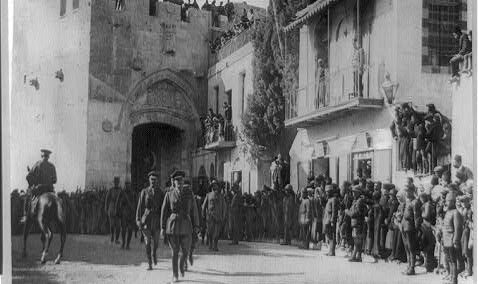Foreign Affairs
There was, once, a very different conservatism.

Anyone who has read James Barr’s phenomenal duology (often found as a good affordable pack to buy from Amazon) on Britain’s last days as an empire in the Middle East should be fascinated at the current British trajectory. The imperial Tories considered Israeli Kibbutzniks as both a socialist endeavor and an American influence operation for taking over the imperial British sphere in the Middle East. (Rightly, as it turned out.) British Tories also didn’t forget the early Jewish terrorism and ritual humiliation of the British army. These are recorded facts, not judgements. Tempora mutantur and all that.
For the uninitiated, A Line in the Sand and Lords of the Desert chart the dying days of British hegemony and imperial arrogance and myopia—particularly relevant today. The American Middle East policy wasn’t altogether altruistic. Britain was hollowed out after the two world wars. Oil was the prime commodity for a great power; America risked being tariffed out if Britain continued as an empire. The Atlantic Charter created by Churchill to save the empire from the Nazis, incidentally, fueled the nationalistic impulses that took down the empire itself. Of course, the Soviets didn’t help in neither the Middle East nor Africa.
The original sin was, as always, revolutionary liberal zeal in the educated class. The Brits love a Lawrence of Arabia figure opposed to tyranny, helping the subaltern foment revolutions against higher powers. Byron and the Romantics despised Castlereagh, not just because of the loss of Napoleon Bonaparte, but because Castlereagh was blue-blooded, prudent, and farsighted enough to make Napoleon impotent by packing him off and helping Metternich and Nesselrode restore the ancien regime instead of making Boney a martyr.
A similar prudential instinct from Lord Lansdowne was overruled in 1917, resulting in the destruction of Germany as a great power and the collapse of the Ottomans. The vacuum that resulted in the Middle East after Arab Larry’s misadventures and the successive Arab revolts sowed the seeds of future turmoil. Britain struggled to balance the competing forces of Arab nationalism, political Islam, and Zionism. And after that overstretch in Palestine, came the second world war in Europe and India.
The British officer class still had its own momentum and imperial instincts in those early Cold War days. Even in 1948, Britain was playing a balancing role. For example, research shows that British involvement in the 1948 war was intended to save a stalwart and timeless imperial ally, the King of Jordan:
The army of King Abdullah’s Transjordan that went to war with Israel in the Arab– Israeli conflict of 1948–49 – the Arab Legion, later the Jordanian army – was a remarkable military unit. First, some 37 British officers and 25 British non-commissioned officers (NCOs) led the army; second, the Legion was the most effective Arab army in 1948, in large measure because Britain as Abdullah’s ally led, funded, trained, and equipped it. It was the only Arab army in 1948 that covered itself in glory, defeating Israel in two sets of battles in and around Jerusalem’s old city and at Latrun (15 May–18 July), interrupted by a ceasefire (11 June–8 July). Most British Servicemen in the Legion were seconded from the British army, some had private contracts with Abdullah, and three were detached from the colonial service, including the Arabic-speaking supreme commander of the Legion, former army officer John Bagot Glubb.
The Spectator quoted British officers in Jordan:
At the inception of the Emirate, however, the collapse of Turkish rule had left the country without a force to maintain law and order…. Despite difficulties of language and temperament the vast majority of the British became fast friends with the Arabs they were training. I speak from experience when I say that without exception the British were amazed by the mental receptiveness of the Arab soldier, and his ability to master the control of complicated instruments of war such as wireless, guns and armoured cars.
The balance didn’t last. Britain lacked the interest, money, and the manpower to garrison the Middle East after the loss of India. Arab nationalism was initially supported by the Soviets, and Israel was backed by America; the forces of that superpower rivalry overwhelmed Britain acting alone.
Subscribe Today
Get daily emails in your inbox
Christianity gave way to secularism among the officer class and bureaucracy, taking away another primary concern of safeguarding Jerusalem. Reactionary Tories with their instinctive independence of thoughts as well as Yankee-phobia mostly died out. Others saw America as a force-multiplier to older imperial power and visualized Britain as the “Greeks to America’s Rome”—although, given the British push in Iraq, Libya, and currently in Ukraine, one can debate how good it has been in effect for the new Rome upon the Potomac.
It is ironic, then, that the Americans wanted to stop Britain from leaving the Middle East altogether. “For God’s sake, act like Britain!” Secretary of State Dean Rusk demanded from Britain’s Foreign Secretary George Brown as London decided to pack up from Aden, its last major imperial outpost, exhausted and unable to quell an Arab insurgency.
The British destruction of a mellow and hollowed-out Ottoman power resulted in her own overstretch and sowed the seeds of permanent conflict; similarly, in a curious way, the American hand in slowly eroding British power in the Middle East earned the U.S. in a burden without anyone to share it with, and from which the U.S. is still unable to retrench.
>>> Read full article>>>
Copyright for syndicated content belongs to the linked Source : The American Conservative – https://www.theamericanconservative.com/imperial-follies-in-the-holy-land/